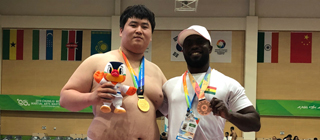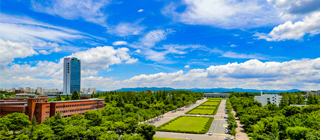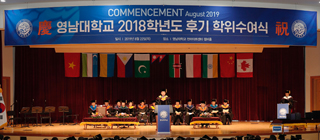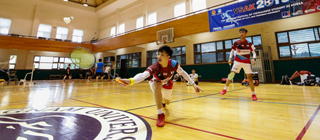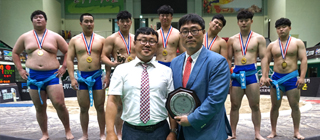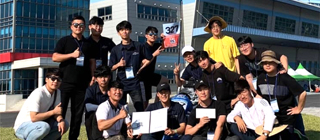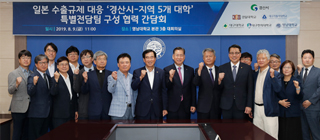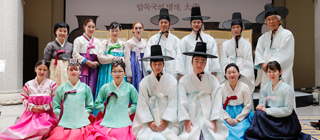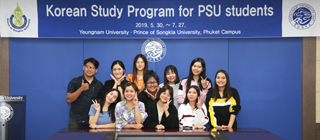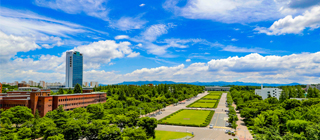-
Park Chan-joo wins gold medal in the free weight division, protecting the reputation of the country where ssireum originated Koffie Sameul from Ghana currently studying at the Park Chung Hee School of Policy and Saemaul wins bronze medal in his first appearance [September 11, 2019] The YU Ssireum Team (Coach Heo Yong) won the gold and bronze medals at the 2019 Chungju World Martial Arts Mastership. At the 2019 Chungju World Martial Arts Mastership held at the Chungju National Sports Center from September 5 to 6, Park Chan-joo (21, Special Physical Education, junior, right on photo) of the YU Ssireum Team an Koffie Samuel (40, Park Chung Hee School of Policy and Saemaul, master’s course 2nd term, right on photo) won the gold medal and bronze medal, respectively, in ssireum. In the free weight division, Park Chan-joo who represented Korea defeated multiple Mongolian athletes weighing over 180kg and took the gold medal to keep Korea on top of ssireum as the originators of ssireum. Park Chan-joo said, “I am very proud of winning the gold medal and winning the title of the world’s best ssireum athlete in the first international competition. I will also do my best to win the gold medal at the 100th natinal sports competition that will be held in Seoul later in October.” Also, Koffie Samuel from Ghana, who won the bronze medal in the –75kg division, first learned about ssireum while studying at YU. This is his first appearance in an official tournament. After completing the highly intense training of the ssireum team and shedding off 4kg to compete in the tournament, he was able to take home the bronze medal. Koffie Samuel said, “I registered for this tournament with the goal of experiencing the traditional sports of Korea for myself. It was very meaningful just to be able to learn ssireum and compete in the tournament, and it feels like a dream to have won the bronze medal.” He added, “I would like to thank the coach and trainer and Kim sang-hyu of the ssireum team who helped me greatly with training for this tournament.” The 2019 Chungju World Martial Arts Mastership is the world’s only comprehensive martial arts competition where over 4,000 athletes from over 100 countries participated in 20 martial arts such as ssireum, judo, taekwondo and jujitsu. This year, around 100 athletes from 14 countries participated in ssireum.
-
School of Mechanical Engineering Professor Joo Sang-woo selected for the ‘Leading Research Center’ project for the Daegu, Gyeongbuk and Gangwon regions Received 12.2 billion KRW in national funding to establish the ‘Autonomous Vehicle Parts and Materials Green Technology Leading Research Center’ Expected to construct a ‘core parts development-corporate technology transfer-commercialization’ system for future cars [September 2, 2019] YU (President Sur Gil-soo) will lead the development of ‘green technologies’, which is a core future industry. The green technology-based research project based on green technologies of Professor Joo Sang-woo’s team at the YU School of Mechanical Engineering was selected as a ‘regional innovation leading research center’ project hosted by the National Research Foundation. In this project, Professors Park Joo-hyun (Electrical Engineering), Jung Ho-yeol (Information Communication Engineering), Kang Mi-sook (Chemistry), Kim Hye-gyeong (Material Engineering) and Kang Seok-won (Automobile Engineering) from YU and Professor Jeon Sang-min (Chemical Engineering) and Noh Joon-seok (Mechanical Engineering) from POSTECH participated as core researchers. With the selection of this project, YU will receive a total of 12.2 billion KRW in funding from September of this year to February 2026 to develop autonomous vehicle parts and materials technologies based on green technologies. YU will establish the ‘Autonomous Vehicle Parts and Materials Green Technology Leading Research Center’ to conduct research on heat, humidity, and lightweight to improve the system efficiency of autonomous vehicles and conduct research on driving environment awareness and control parts. It will also take part in projects for fostering expert personnel and they are thus expected to construct a sustainable development system for the local industry while fostering local human resources. Green technologies create materials with excellent economic efficiency based on the structures and functions of life found in nature, and it is an innovative technology that is eco-friendly and that can prevent environmental pollution. According to the US consulting firm FBEI, it is an industry with great potential where the market is expected to grow up to 1 trillion USD by 2025. Currently, the US, Germany and Japan are focusing on the green technology industry as a new national growth engine industry. Professor Joo Sang-woo, who is supervising this project, said, “We are planning to analyze and develop all parts that can be applied to the autonomous, smart and eco-friendly vehicle sectors, which are all future growth engine industries, in order to gain platform technology assets in advanced.” He added, “Our goal is to construct a smart leading research center with a system where the corresponding technologies can be transfered to local businesses for commercialization.” The parts and materials platform technologies that will be developed through this research project can be used not only for automobiles, but also in the manufacturing sector such as smart factories, as well as in other general industries, and therefore, it is expected to create significant added value such as creating jobs and activating the economy, not to mention the development of the local industries. YU President Sur gil-soo said, “YU has recently been selected consecutively to oversee the HuStar project that the local government is focusing on. This shows that YU is being recognized for its expertise and knowhow in education and research in the future core industry sectors such as future automobiles and water.” He added, “This can determine the future of the local society, so our university will take the initiative for the relevant institutes such as the local government and businesses to gather their capacities.” Meanwhile, the ‘Local Innovation Leading Research Center Project’ is a project that aims to gather the capacities of innovative bodies in the region focusing on local universities to create new jobs by fostering talented local human resources based on the leading research center and to spread research outcomes to improving the competence of local businesses. This project is supported by the Ministry of Science and CIT and is hosted by the National Research Foundation. A total of four regions in the nation are being supported such as Busan-Ulsan-Gyeongnam, Daegu-Gyeongbuk-Gangwon, Gwangju-Jeonbuk-Jeonnam-Jeju, and Daejeon-Chungbuk-Chungnam-Sejong, and YU wa selected as the supervising university for the Daeg-Gyeongbuk-Gangwon region.
-
Diplomas bestowed at the Cheonma Art Center Chamber Hall at 10:30 a.m. on the 22nd 78 doctorates, 404 masters, 1,126 bachelors [August 22, 2019] YU (President Sur Gil-soo) held the 2018 second semester commencement ceremony at the Cheonma Art Center Chamber Hall at 10:30 a.m. on the 22nd. On this day, 1,126 students received their bachelor’s degree, 404 master’s, and 78 their doctorate’s degree. Among then, 190 international students (53 bachelors, 108 masters, 29 doctorates) also received their diplomas. YU President Sur Gil-soo, Graduate School Dean Sur Jung-sook, and other faculty members of the university attended the ceremony to bestow students their diplomas and congratulate them. YU President Sur Gil-soo said, “I would like to congratulate all of the graduates who received their honorable diplomas on this day after years of hard work. I am confident that the knowledge and skills you gained at YU will act as a great driving force for the development of the Republic of Korea.” He added, “The 240,000 alumni of YU have played pivotal roles in the amazing development of Korea. I challenge the graduates today to also be leaders of the future like your seniors.”
-
Promoting friendship of international students from Vietnam and support studying abroad... 12th year anniversary Over 1,000 people including international students, graduates and embassy personnel gather on the 10th and 11th Making memories for studying in Korea while enjoying sports festivals and cultural performances [August 12, 2019] <The 12th Sports Festival of Vietnamese Students in Korea was held over two days on the 10th and 11th at YU> Vietnamese students studying in Korea gathered at one place. The 12th Sports Festival of Vietnamese Students in Korea was held over two days on the 10th and 11th. This sports festival is held every year by the Vietnamese Student Association of Korea (VSAK) to promote friendship and support life while studying abroad among Vietnamese students, and it is celebrating its 12th anniversary this year. This sports event, which was hosted by the YU Vietnamese Student Association (VSAYU) this year, was joined by over 1,000 people including Vietnamese students studying at 22 universities in Korea, graduates, and personnel from the Vietnamese embassy. YU Vietnamese Student Association President Tran Van Thien (22, YU Department of Electronic Engineering, sophomore) who prepared this event said, “This is a big event where Vietnamese students studying all over Korea including Seoul, Daejeon and Busan gather, and therefore, we started making preparations three months ago.” He added, “We were able to host this event successfully because students at other universities were also willing to help. Thanks to the success of this year’s event, I think students are already looking forward to the sports festival for next year.” This sports event that was held over two days included not only soccer, badminton and table tennis at the YU main field, indoor gymnasium and Cheonma Art Center, but also other events including chess and cultural performances. The Vietnamese students who participated in this event slept at the YU dormitory for this one-night, two-day event. <‘12th Sports Festival of Vietnamese Students in Korea’ held at YU (Cultural Performance-Cheonma Art Center)> YU President Sur Gil-soo said, “I am sure that studying abroad so far away from home is not an easy task. I hope that the students will be able to spend time with friends, juniors and seniors from their home country at YU and make great memories of studying abroad.” He added, “There has been a growing number of international students from Vietnam not only at YU, but all around Korea. Our university will provide utmost support so that students from Vietnam will be able to adapt to life in Korea well and focus on their studies.” Meanwhile, there are about 600 international students from Vietnam including undergraduates, graduate school students, language program students, and exchange students at YU.
-
‘Second Place’ at the 11th Gurye National Women’s Cheonhajangsa Championship and Collegiate Jangsa Ssireum Championship Ranked first in the College Team Rankings [August 26, 2019] <YU Ssireum Team winning at the 16th National Haksan Ssireum Championship> [Source: Korean Ssireum Association] The YU Ssireum Team (Head Coach Heo Yong) took first place and second place at recent ssireum championships, thus placing YU in first place for collegiate team rankings. YU won first place in the collegiate team matches at the 16th Haksan National Ssireum Championship held in Boeun-gun, Chungbuk from August 14 to 20. After a tight match against Kyungnam University winning 4:3, YU won the championship trophy. YU defeated Yongin University and Kyungnam University, who both became champions in other contests this year, to become the top college team. [Source: Korean Ssireum Association] YU also took second place at the 11th Gurye National Women’s Cheonhajangsa and Collegiate Jangsa Ssireum Championship held at the Gurye Gym in Jeonnam from the 22nd to the 25th. At this tournament, Park Chan-joo (21, Dep. of Special Physical Education, junior) became the champion of the Jangsa class and Jung Tae-hwan (19, Dep. of Special Physical Education, freshman) and Jung Jong-jing (19, Dep. of Special Physical Education, freshman) took second place in the Cheongjang class and Yongjang class, respectively (photo below), thus performing excellently in both team and individual matches. [Source: Korean Ssireum Association] YU Ssireum Team Head Coach Heo Yong said, “I think the full-hearted support from not only the president of YU, but also all of the faculty members helped us have good results. In particular, I know it must have been hard training for the matches in the hot summer weather. I really want to thank the athletes who persevered through the training without complaining.” He added, “We will continue to do our best to perform well to repay the university for its support for our team no matter how difficult the conditions were.”
-
All 3 teams awarded... ‘MYEVE’ team wins ‘silver medal’ in EV sector ‘Bronze medal’ and ‘Consolation prize’ in the On-road (Formula) sector [August 27, 2019] <YU ‘MYEVE’ team that won the silver medal in the EV sector at the ‘2019 KSAE Collegiate Auto-building Competition’> YU (President Sur Gil-soo) was awarded three times at the ‘2019 KSAE Collegiate Auto-building Competition’. This was co-hosted by the Korean Society of Automotive Engineers (KSAE) and the Korea Automobile Manufacturers Association celebrating its 13th anniversary since first being held in 2008. This year it was held at the Saemangeum Gunsan Racing Track from the 16th to the 18th. This contest was held in a total of four areas such as off-road (Baja), on-road (formula), electric vehicles (EV), and technology (technological idea, design). A total of about 2,700 students from 186 teams from 98 universities participated in this event. From YU, MYEVE team participated in the EV sector while the YUSAE and Cheonma DM teams participated in the on-road sector. All three YU auto-building clubs were awarded at this contest with MYEVE winning the silver medal, YUSAE winning the bronze, and Cheonma DM team winning the consolation prize. Park Sae-hyun (23, YU School of Mechanical Engineering, junior) of the MYEVE team said, “Unlike last year, we completely renewed the design and production of the automobile. I think the high level of technical perfection in the power train system led to the good result. We are a bit disappointed because we could have done even better such as taking first place in a few other areas,” but added, “We are planning to participate in the Hwaseong Green Car tournament and Yeonggwang Smart e-Mobility Contest this year. We will make the necessary upgrades and try to take first place in the next contest.” The YUSAE team, which won the bronze medal in the on-road sector this year, is well known as a powerhouse in collegiate auto-building contests. The YUSAE team took overall first place for four years from 2016 at the ‘Baja SAE’ held annually at YU and has demonstrated unrivaled skills. YU Department of Automotive Engineering Dean Hwang Pyeong said, “Students have learned a lot by designing their own vehicles, making it, and driving it on the track.” He added, “In addition to the theories and knowledge gained in the classroom, their experiences in competing in these contests will be great assets for them.”
-
Cooperating with local companies to provide support for ‘technological independence’ Efforts to minimize damages to local companies through support on 100 product development technologies including materials, parts and equipment [August 9, 2019] Gyeongsan City and five major local universities (Kyungil University, Catholic University of Daegu, Daegu University, Daegu Haany University, Yeungnam University) will organize a special task force team to respond to the Japanese export restrictions. At 11 a.m. on the 9th, the mayor of Gyeongsan, presidents of five universities, director of the industry-academic cooperation teams, and the director of the planning office met at the main conference room on the 3rd floor of the YU main building to agree to gather their capacities to operate a special task force team. The special task force team made up of the local government and five local universities is planning to provide support for local small and medium companies that will be affected by Japan’s motion to exclude Korea from its white list. The special task force team mainly comprised of Gyeongsan city and major industrial research centers of local universities is expected to provide technological development support and consulting for local small and medium companies, diagnosis and resolve technologies having on-site difficulties for small and medium companies, diagnosis and consulting for R&D plans, and pursue joint industry-academic cooperation projects to minimize damages to local companies. Local government, Gyeongsan City Yeungnam University Kyungil University Catholic University of Daegu Daegu University Daegu Haany University Industrial technology sectors Semiconductors Machine metals Display Automobiles Electric/electronic Chemical materials Materials Technology Research Center Optical Nanotechnology Research Center Industrial Technology Research Center Mechanical Technology Research Center Automobile Lighting Convergence Expert Fostering Project Team Automobile Function Safety SW Research Center Information Communication Research Center Wireless Multimedia Regional Innovation Center Basic Science Research Center National MW-class Solar Power R&BD Testing Center Daegu-Gyeongbuk Solar Cell Regional Innovation Center Automobile Parts Testing Regional Innovation Center Automobile Parts HRD Project Team Autonomous Driving Vehicle Convergence Technology Research Center Future-Automobile Parts ICC Hydrogen Fuel Cell Technology Research Center Optical Display Research Center KJU Unmanned Aviation Training Institute Drone Expert Fostering Project Team Smart Optical Research Center Future Automobile Technology Research Center Brain Engineering Research Center Energy Personnel Fostering Center 4th Industrial Revolution Research Center Optics Convergence Technology Natural Science Research Center Biomedical Convergence Research Center Marine Bio Center Next-generation Construction Machine Parts Personnel Fostering Project Team R&D Consulting Center Industrial Technology Research Center Light Materials and Parts Technology Support Project Team High-tech Molding Processing Regional Main Industry Support Project Team Information Communication Research Center Mixed Real Convergence Research Center AI Center Basic Science Research Center Central Machine Institute, Infrastructure Support Center Nonferrous Metal Surface Treatment Center Basic Science Research Center DHU Bio Convergence Test Center Traditional Medicine Bio-resource Research Center Girin Hub Tech Smart IT Major IT Medical Data Science Major Furthermore, research centers of the five universities in the Gyeongsan region will provide support through technological consulting and technologies for areas of difficulties to local businesses involved in semiconductors, display, automobiles, electric and electronics, mechanical metals, and chemical materials. In particular, the government is planning to concentrate on supporting technologies needed for developing 100 products that the government stated to ‘require stabilized distribution in advance’. Also, Gyeongsan City is also planning to provide administrative support services to respond to Japan’s export regulations and it is therefore expected to serve as a foundation for constructing a government-academic-industry coalition system to respond to Japanese export restrictions.
-
YU Korean Language and Culture Research Center and Multi-cultural Education Research Center holds the ‘Global Youth Culture Experience Camp’ 65 youths from four countries including Russia and Mongolia ‘learn about Korea’ over 6 days YU holds systematic program such as Korean language education for multi-cultural families and immigrants [August 8, 2019] YU (President Sur Gil-soo) stepped up to share about Korea to foreign youths. The YU Korean Language and Culture Research Center and Multi-cultural Research Institute will operate the ‘global youth culture experience camp’ hosted by Gyeongsangbuk-do. This camp that will be held for five nights and six days until the 10th will be joined by 65 youths from four countries including Russia, China, Mongolia and Vietnam. The foreign youths participating in this camp will visit the Andong Hahoe Folk Village, Gyeongju Bulguksa Temple, and Cheomseongdae to experience Korea’s history and culture, and also take a look at the industrial sites by visiting the Gumi Samsung Electronics Smart City, etc. In particular, the Korean language class, traditional coming-of-age ceremony (gwallye, gyelle) experience, K-pop dance class, etc. held jointly by the YU Korean Language and Culture Research Center and Multi-cultural Research Institute were hugely popular among participants. Nguyen Lang Tung Lam (17) from Vietnam who participated in the traditional coming-of-age ceremony called ‘gwallye’ where participants wear the traditional hanbok garment and wear the traditional hat called gat said, “This is my second visit to Korea. Unlike my previous trip, I had the opportunity to experience various cultures of Korea though my trip was short.” He added, “The most memorable moments were being able to experience traditional coming-of-age ceremonies of Korea and visiting Andong Hahoe Folk Village to experience the past traditional cultures of Korea.” This camp included various programs of the YU Korean Language and Culture Research Center and Multi-cultural Research Institute, thus raising satisfaction of participants for this. The YU Korean Language and Culture Research Center and Multi-cultural Research Institute is equipped with educational knowhow and systematic curriculums for multi-cultural families, immigrants, and foreigners, and it operates various educational programs supported by Gyeongsangbuk-do and the Daegu Office of Education. The most famous examples are the Gyeongsangbuk-do multi-cultural family support funding project ‘Shinnari Learning with Gyeongsangbuk-do’ and the Daegu Office of Education’s ‘Bilingual Teacher Training Program’. ‘Shinnari Learning’ is a program that supports language education and emotional support for students of multi-cultural families and immigrant parents. It provides supports for bilingual education and club activities for students and Korean language education and art activities for immigrant parents. This year, a total of 42 people including 32 students participated and classes opened in May and will end in October. The bilingual teacher training program fosters specialized leaders for the multi-cultural community and fosters educators to provide a bridgehead for immigrants to take part in the Korean society. It is comprised of a total of 15 hours of classes including bilingual education and identity, foreigner teaching methods, and counseling dialog techniques. This year, a total of 41 people including immigrants from Russia, Vietnam and Uzbekistan completed the program. Those who completed the training are working as foreign teachers at elementary schools and interpreters at police stations. The YU Multi-cultural Education Research Center Director Nam Jeong-seop said, “By learning the language and culture, you can naturally become a member of the multi-cultural community,” while adding, “YU will come up with various programs and provide support so that multi-cultural families can live stable lives as members of our community and furthermore, help children improve their bilingual abilities to develop into global human resources in the future.”
-
8-week short-term Korean language course including Korean language, culture and economy High level of satisfaction among trainees last year and returned to YU again this year Songkla University operates regular ‘Korean language education short-term training program’... Cornerstone for increasing international students from Thailand [July 26, 2019] <Students from Songkla University of Thailand coming to YU for the second straight year to learn Korean> YU (President Sur Gil-soo) is acting as a hub for ‘learning Korean’ by international students. Recently, 11 students from the Prince of Songkla University, Phuket Campus completed an eight-week Korean language education program and returned to Thailand on the 26th. The Thai students who visited YU were those who had received an eight-week training program at YU last year. They were satisfied with the training last year and decided to visit YU once again this year. The training expenses for these students were paid in full by Songkla University. This shows just how assertive they are for learning Korean. <Students from Songkla University in Thailand learning Korean manners> These students major in Korean studies at the Songkla University of International Studies. They learn not only the Korean language, but also the culture, history and politics of Korea. They complete short-term language programs in Korean language education during summer break through an MOU with YU. These students began training on May 30 and completed an intensive eight-week Korean education program. The students visited Seoul and Busan as well to check out the major tourist destinations and industrial sites to experience first-hand Korean culture and economics. Yaowapa Srisuwan (27), a junior at the Songkla University Department of International Studies who participated in the training for the second straight year, said, “In last year’s training, I was able to improve my Korean skills, taste Korean food and experience various cultures, which were very meaningful for me as a major in Korean studies. If I have the opportunity again in the future, I hope to come to YU again.” <Songkla University students who visited YU for the second straight year to learn about Korea (completion ceremony)> YU Korean Language Institute Director Heo Chang-deok said, “Many foreign students come to YU to learn the Korean language and about Korea. The satisfaction level of students who received training is very high.” He added, “Songkla University of Thailand is planning to offer short-term training programs in Korean language education every year. This training will make it possible to diversify our pool of international students and also increase the number of international students.”
-
YU Industrial Technology Research Center to receive 3.4 billion KRW in funding by the local government until April 2023 Collaborate with research centers and companies to foster customized experts in the future automobile sector Total of 170 students to be selected to provide outstanding human resources for local companies and to create high quality jobs [July 23, 2019] YU (President Sur Gil-soo) was selected for the ‘HuStar (Human Star) Innovation Academy’ being pursued by Daegu City and Gyeongsangbuk-do. HuStar Innovation Academy is an innovative personnel fostering project to incubate people who will lead new industries in the future. In this project, university research centers will enter agreements with companies through the supervision of research and support agencies of Daegu and Gyeongbuk and operate graduate school-level field work education meeting corporate demands for five months, and students who complete the education will undergo a three-month internship at the company with the goal of finalizing employment at the corresponding company. Gyeongbuk selected project teams in the four fields of future cars, AI-SW, bio and robots. The YU Industrial Technology Research Center (Project Supervisor, Department of Automotive Engineering Professor Hwang Pyeong) was selected as the institute in charge of the future automobile sector. YU is planning to collaborate with the Gyeongbuk Hybrid Parts Research Center and the Gyeongbuk Automobile Embedded Technology Research Center to incubate personnel customized to the future automobile sector equipped with practical skills. With the selection for this project, YU will receive 3.4 billion KRW from Gyeongbuk starting from August of this year until April of 2023 for this project. YU will complete organization of the curriculum, confirm student selection plans, and select students by September for customized education for corporate needs and in the future automobile sector and begin full-fledged operation of the innovation academy from October. Students will be selected from technical colleges, universities, graduate school graduates and soon-to-be graduates, and a total of 170 students are scheduled to be selected in total after selecting 20 for this year. YU President Sur Gil-soo said, “As the future of local development depends on the HuStar Project, it is imperative that the local government, universities and relevant research centers and companies gather their capacities.” He added, “We will focus on fostering outstanding personnel for future growth industries to continuously supply excellent human resources to local companies, while also constructing a virtuous circle system in which high-quality jobs lead to regional development.”
